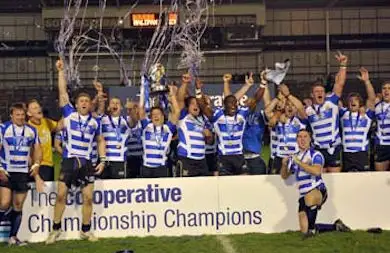A licensed future

The kick off to the 2011 season is accompanied by a great deal of uncertainty about the future. The RFL are looking to change the structure of what are, at present, the Co-operative Championships, with such proposals as minimum standards for Championship clubs, an expansion of the Championship to 14 clubs and promotion and relegation between Championship One and amateur divisions.
There has been talk ever since Super League became a licensed competition of the Championship doing likewise, and this seems to be the beginning of such a process.
That won’t happen just yet: the RFL are proposing “that promotion and relegation between the Championship and Championship One will continue between 2012 and 2014, after which the RFL could also consider promotion and relegation between Championship One and the Conference Leagues”. Yet the implication of this statement is that the RFL are considering ending automatic promotion and relegation between the two Championship divisions after 2014.
Reading between the lines somewhat, the RFL’s vision seems to be of a fully-licensed 14-team Super League, a fully-licensed 14-team Championship and several divisions below that which consist of teams that are currently towards the bottom of Championship One and amateur sides. (Perhaps this is why the RFL have rebranded the amateur game as the community game, because in the future not all the clubs at that level will be amateur.)
You can see the logic in this. From the RFL’s point of view a team like Leigh Centurions probably aren’t Super League material, yet they’re a club far too big for the Workingtons or Rochdales of this world. Leigh would struggle in Super League, hence a licensing system that allows the RFL to choose clubs that won’t struggle. Yet there are clubs, like Workington and Rochdale, who might struggle at Championship level, and therefore it seems the RFL want initially Championship minimum standards and latterly Championship licensing to choose those clubs that are suitable for Championship level.
That’s the theory anyway. It could be argued that RFL are being rather presumptuous about which clubs will never be suitable for which leagues. After all Featherstone were only promoted in 2007, Barrow in 2008, and now these are two of the division’s top teams. In 2006 Hull KR and Whitehaven were two of the top teams in National League One, and now one is a mid-table Super League side and the other has been relegated into the bottom tier. The RFL’s determinism should leave us feeling a little bit uneasy.
The Championship divisions presently contain 21 clubs, so a 14-team Championship would leave but seven clubs to contest Championship One, or whatever that league is renamed. Hence “the RFL will actively seek expressions of interest from clubs currently playing outside Championship level to join the third tier competition”. In practice this means top clubs from BARLA National Conference and the RLC National, as well as other RLC Divisions. This could mean the likes of Leigh East, Bramley Buffaloes, Warrington Wizards or Valley Cougars.
It’s not the first time the RFL have tried something like this. In 1993 the BARLA National Conference League was intended to become a bridge between amateur and professional games, as was the erstwhile National League Three in 2003, but these efforts failed. With BARLA considering a switch to the summer, this time a league bridging the gap might just work. It makes sense really: Hunslet Hawks might share professional status with Leeds Rhinos, but realistically they’re much closer to the level of Bramley – or, in fact, closer to the level of Featherstone Lions than Featherstone Rovers.
The RFL’s proposals as they stand do make some sense, and they deserve credit for being so open and holding a consultation period. Yet keeping clubs locked in place – whether in Super League, Championship or outside those divisions – does seem strange when uninhibited clubs can change their fortunes in just a few short years. The opportunity to move within the divisions must remain – and this opportunity should really be based on playing performances, or an important element of competitive sport has been removed.
Keep Your Eye On Rugby League